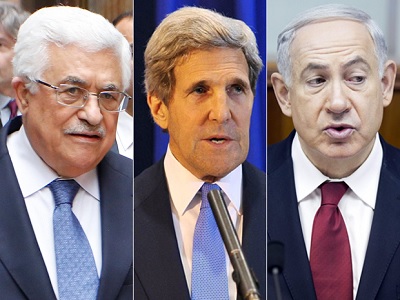
By Jamal Kanj
Following serious cajoling by the US, the European Union and arm twisting by Arab governments, the Palestinians entered what was to be nine months of negotiations with Israel. The Palestinians, who had forgone demands for Israel’s compliance with previous signed agreements before starting new negotiations, were promised that this time Israel would enter into serious discussions to reach a final agreement by April 29.
After stalling for four months, Israel refused to discuss any issues but security arrangements. Negotiations were effectively over late last November when US Secretary of State John Kerry mobilised a large team, led by a former American Israel public affairs committee employee, to resuscitate it.
The looming deadline is around the corner and there is no indication that the two sides are any closer than when they started. In fact, the Israeli prime minister added two fresh conditions this week: No final deal with Palestinians unless they relinquish the rights of refugees, and an additional recognition of Israel as a Jewish state.
For Israel, which has perfected the temporising game, these nine months were just a prelude to seek another extension in the talks and to deflate the propensity of the international boycott movement while undermining the peace process by building new “Jewish only homes” – over 7,000 units since July.
This week, Israeli Prime Minister Benjamin Netanyahu also declared in an interview with the Los Angeles Times newspaper that “It will take us at least a year to exhaust these negotiations.”
Soon after the 1991 Madrid peace talks, the then departing Israeli prime minister Yitzhak Shamir revealed in June 1992 to an Israeli newspaper that he would have kept negotiating “for 10 years and in the meantime we would have reached half a million,” in the West Bank.
He lamented “in the next four years I will not be able to complete the (Jewish) demographic revolution,” explaining that “without this demographic revolution, there is no reason to hold autonomy talks as there now is a risk of a Palestinian state.”
True to Shamir’s vision, consecutive Israeli governments (from left and right) dragged the negotiations over almost a quarter of a century, surpassing Shamir’s goal of more than half a million, thus making it geographically unfeasible to establish a liveable Palestinian state.
The ostrichised US and its subservient European Union suffer delusional denial syndrome. They refuse to read palpable writings on the wall: Israel perceives the Palestinian state a risk for which they use peace talk to realise the Jewish “demographic revolution.”
The Israeli-centric overextended use of US’ privileged veto power at the UN Security Council has become the main obstacle to reaching peace in the Middle East. It can even be argued that it is contributing to many of the world’s conflicts today.
Incidentally, it was Israel’s US firsters who fabricated the evidence to justify occupation of Iraq, and are now advocating war with Iran and Syria.
Other world powers have got a grip on it too. As we speak, Russia is employing the same tired “privileged” UN Security Council authority to probably annex Crimea. But only with one difference, unlike the population in Crimea who ostensibly sought Russian support, residents of East Jerusalem and the Golan Heights overwhelmingly rejected Israeli annexation.
China is employing the same “privileged” veto power in its islands dispute with Japan and to maintain its influence over Korea. Acting on behalf of Israel, the US has turned the UN Security Council from a guardian of world peace to a club of hubris kingpins violating international law and creating a New World Disorder.
– Jamal Kanj (www.jamalkanj.com) writes regular newspaper column and publishes on several websites. He is the author of “Children of Catastrophe,” Journey from a Palestinian Refugee Camp to America. A version of this article was first published by the Gulf Daily News newspaper. He contributed this article to PalestineChronicle.com.




